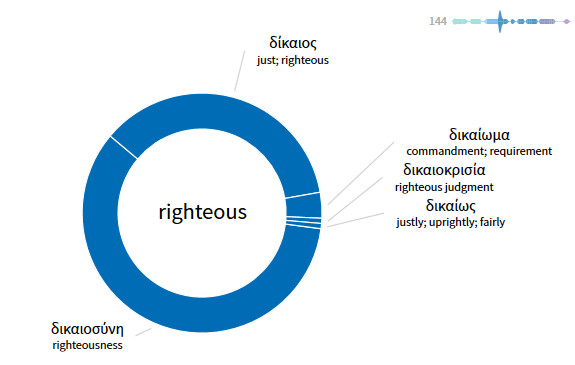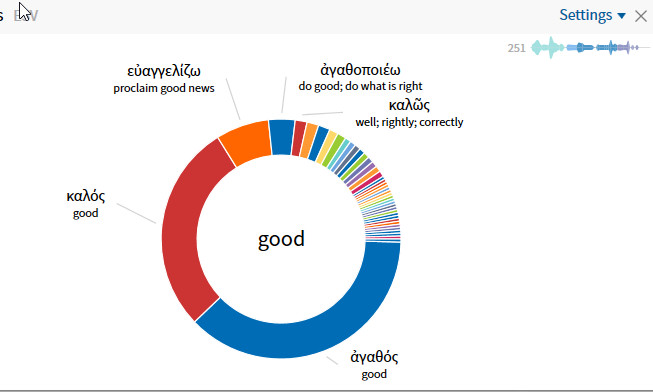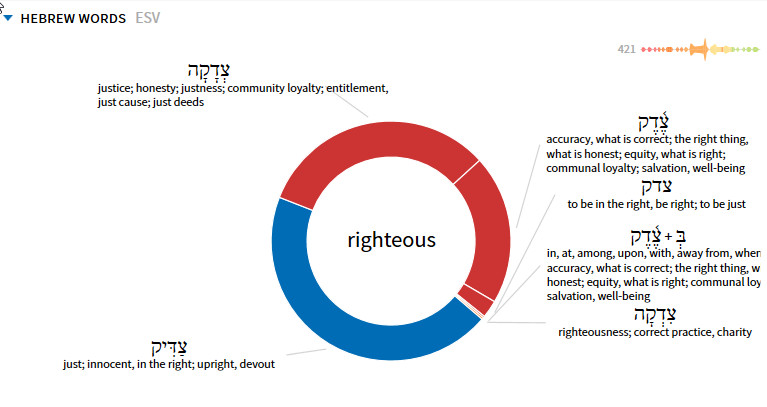RighteousVsGood
- 2016-02-17
- By Editor
- Posted in Bible Study, Word Study
Righteous Vs. Good
Romans 5:7 7 For one will scarcely die for a righteous person—though perhaps for a good person one would dare even to die—
In Romans 5:7 there is are two statements comparing a ‘righteous person’ and a ‘good person’ what one would do for each type of person. Because the translation used “righteous” and “good” it is hard to understand what is truly meant there. With the English translation one would say both are the same as ‘righteous’ and ‘good’ are synonyms of each other. The verse indicates two different people, but the English words do not show the difference.
Bottom Line: How do they differ when the two words can be used as a synonym for the other?
Righteous: adjective – (of a person or conduct) morally right or justifiable; virtuous: he is a good, righteous man, I am sure
synonyms: good, virtuous, upright, upstanding, decent, ethical, principled
Good: adjective, better, best. 1. morally excellent; virtuous; righteous; pious: a good man. 2. satisfactory in quality, quantity, or degree
Compare the two Greek Words:
Righteous – (dikalos) = with the sense: righteous person
Good – (agathios) – with the sense: good person
There are two different Greek words – comparing the Strongs and Lous Nida definitions:
Dikalos – G1342 – 1342 δίκαιος [dikaios /dik·ah·yos/] adj. From 1349; TDNT 2:182; TDNTA 168; GK 1465; 81 occurrences; AV translates as “righteous” 41 times, “just” 33 times, “right” five times, and “meet” twice. 1 righteous, observing divine laws. 1a in a wide sense, upright, righteous, virtuous, keeping the commands of God. 1a1 of those who seem to themselves to be righteous, who pride themselves to be righteous, who pride themselves in their virtues, whether real or imagined. 1a2 innocent, faultless, guiltless. 1a3 used of him whose way of thinking, feeling, and acting is wholly conformed to the will of God, and who therefore needs no rectification in the heart or life. 1a3a only Christ truly. 1a4 approved of or acceptable of God. 1b in a narrower sense, rendering to each his due and that in a judicial sense, passing just judgment on others, whether expressed in words or shown by the manner of dealing with them.[1]
Dikalos – LN88.12 – 88.12 δίκαιοςa, α, ον: pertaining to being in accordance with what God requires—‘righteous, just.’ Ἰωσὴφ δὲ ὁ ἀνὴρ αὐτῆς, δίκαιος ὤν ‘Joseph, her husband, was a righteous man’ Mt 1:19.
It is best to look at the next one as well as they are related:
88.13 δικαιοσύνηa, ης f: the act of doing what God requires—‘righteousness, doing what God requires, doing what is right.’ μακάριοι οἱ δεδιωγμένοι ἕνεκεν δικαιοσύνης ‘happy are those who suffer persecution because of their doing what God requires’ Mt 5:10[2]
Agathios – G18 – 18 ἀγαθός, ἀγαθοεργός [agathos /ag·ath·os/] adj. A primary word; TDNT 1:10; TDNTA 3; GK 19 and together with Strongs 2041 as GK 15; 102 occurrences; AV translates as “good” 77 times, “good thing” 14 times, “that which is good + 3588” eight times, “the thing which is good + 3588” once, “well” once, and “benefit” once. 1 of good constitution or nature. 2 useful, salutary. 3 good, pleasant, agreeable, joyful, happy. 4 excellent, distinguished. 5 upright, honourable.
Agathios – LN57.110 – 57.111 δικαιοσύνηd, ης f; ἐλεημοσύνηa, ης f: to give to those in need as an act of mercy—‘acts of charity, alms, giving to the needy.’
δικαιοσύνηd: προσέχετε δὲ τὴν δικαιοσύνην ὑμῶν μὴ ποιεῖν ἔμπροσθεν τῶν ἀνθρώπων ‘be careful not to do your giving to the needy in public’ Mt 6:1. It is also possible to interpret δικαιοσύνη in Mt 6:1 as ‘religious observances’ (see 53.4).
ἐλεημοσύνηa: αἱ προσευχαί σου καὶ αἱ ἐλεημοσύναι σου ἀνέβησαν εἰς μνημόσυνον ἔμπροσθεν τοῦ θεοῦ ‘your prayers and acts of charity have gone up as a memorial before God’ Ac 10:4.
From these two definitions one sees that the Greek Words show there is a difference in the meaning of each word used. It was in the English Translation that they used “righteous” and “good” and in the English language they do not carry the nuance (shade) or (distinction) of the Greek language to cause enough dissimilarity between the two words.
Compare visually the difference in the two words:
Righteous:
Good:
Looking at the two visual word “donuts” observations:
- “Righteousness” has 144 references in the ESV translation – with only 5 different variations.
- “Good” has 251 references in the ESV translation – with also 5 major variations plus many more as the small color portions indicate.
NOTE the different Greek word for each of the 5 words that ‘righteous’ comes from with each Greek word having a different connotation. In English we use “righteous” and have to use other words to explain how it applies in different situation. In the Greek language they have a different word that carries various shades to different settings or types.
The actual Greek word that was translated “righteousness” found in Romans 5:7 is displayed in the top area with that Greek word translated ‘just; righteous’ and is used 52 of the 144 times.
The largest area for the Greek word that is translated “righteousness” is from the bottom area of the circle that is translated ‘righteousness’ and is used 85 of the 144 times.
This leaves only 7 other times that a different Greek word is found in the Bible that is translated with different English words. The largest of this area is the Greek word that is translated as ‘commandment; requirement’ for 5 times. One time is found in: Ro. 5:18.
The other two would be 1 Greek word translated “righteous judgment” (Ro. 2:5). And another translated “justly; uprightly; fairly” (1 Timothy 2:10).
There is a total of 144 times in 131 verses in the New Testament.
The translated word “righteous or righteousness” is found 567 in 520 verses for the entire ESV Bible translation.
Example: Genesis 6:9 with the Hebrew word H6662 that is translated “righteous”….
Genesis 6:9 (ESV)
9 These are the generations of Noah. Noah was a righteous man, blameless in his generation. Noah walked with God.
Strongs H6662 – צַדִיק tsaddîyq, tsad-deek´; from 6663; just:—just, lawful, righteous (man).
For comparison I’ve included the graphic wheel for “righteous” in the Hebrew language.
Gen6_9w
Looking at the different Greek words used for “Good” :
In Romans 5:7 the Greek word that is translated good is the blue (bottom right) that is found 94 of the 251 times. It is translated “good” but a different Greek Word. (Ro. 5:7 7:12,13)
The next largest area just to the left is another Greek word and it is also translated ‘good’ some 71 or the 251 times. (Ro. 7:16, 14:21)
The next size down is a Greek word translated: “proclaim good news” and found 18 of 251 times in the Bible. (1 Peter 1:12) (There are none found in Romans.)
In the Expositor’s Bible Commentary it states this about Romans 5:7:
6–8 Having dwelt on the powerful influence of the divine love ministered to the hearts of believers by the Spirit, Paul goes on to explore the depths of that love, finding it in the cross of Christ. The demonstration of God’s love in Christ came “at just the right time.” This recalls Paul’s placing of the incarnation and redeeming work of our Lord in the fullness of time (Gal 4:4). Since the argument of Romans has included the purpose of the law as bringing clear knowledge of sin (3:20) and as working wrath (4:15), the connection with the Galatians material is fairly close. The law had operated for centuries and had served to expose the weakness and inability of man to measure up to the divine standard of righteousness. No further testing was needed. It was the right time. One may ask, perhaps, Suppose it be granted that Galatians and Romans have the same emphasis on this point, why then do they not have the same term for “time” (Rom has kairos and Gal chronos)? Actually there is no perceptible difference, since the word “fulness” (plērōma) in Galatians introduces the very emphasis of kairos-time as to its character rather than as to its duration.
“Powerless” is the translation of a word that commonly means “weak” or “sickly,” but here it has a somewhat specialized force well expressed by Sanday and Headlam as “incapable of working out any righteousness for ourselves (in loc.).” A still more uncomplimentary description of those who needed the intervention of Christ’s death on their behalf is “ungodly.” The same term was used in the striking statement of 4:5 that such are the people God justifies.
A third word descriptive of those for whom Christ died is “sinners.” The verb “to sin” has been used in 3:23 to summarize the human predicament traced in the opening chapters. We need to see how Paul prepares the way for the impact of this term by contrasting it with both “righteous” and “good.” He puts aside for the moment the technical theological force of the word “righteous” in the sense of “justified” and uses it as it is used in ordinary parlance. Likewise, the ignores the fact that in 3:12 he has quoted “There is no one who does good” from Psalm 14:3, and then proceeds to use “good” as we do when recognizing kindness and benevolence in one another. In other words, Paul is illustrating a point from ordinary life. It is a rare thing, he says, to find a person ready to die for an upright man, but conceivably it would be easier to find one willing to die for a good man. Evidently the “good man” stands on a higher plane than the “righteous man.”
Lightfoot berates those who profess to see no substantial difference between the two, quoting extensively from the Fathers to show that they are not synonymous. The righteous man is righteous, but nothing more. He lacks feeling for others. He may be so severely just that he is unattractive, if not actually repellent. On the other hand, the good man, while not lacking righteousness, goes beyond the other by being kind and benevolent (Notes on Epistles of St. Paul [London: Macmillan, 1895], pp. 286, 287). The interpretation is slightly complicated by the absence of the article with “righteous,” whereas “good” has it. This opens the possibility that the reference is not to a good man but to “the good cause,” especially the public good (so Leenhardt, in loc.). But the context requires that all three words-righteous, good, and sinners-be treated as personal.
Now Paul is ready to proceed to his point. It was for “sinners” Christ died, for men who were neither “righteous” nor “good.” The contrast is between the tremendous worth of the life laid down and the unworthiness of those who stand to benefit from it. Back of the death of Christ for sinners is the love of God (v. 8): God loved; Christ died. No attempt is made to deal with the Savior’s reaction or motivation. Paul leaves much to Christian awareness of the intimate bond between Father and Son, the whole truth about God being in Christ (2 Cor 5:19) and Christ being motivated by love for the lost John 15:12, 13). What he puts in the foreground is the love of God, and this Paul underscores by designating it as “his [God’s] own love.” It is distinctive, unexpected, unheard of (cf. John 3:16).
Four times in these three verses the expression “die for” occurs, and in each instance the preposition is hyper (on behalf of), commonly employed by Paul in such contexts. He could have used anti in the place of, which would stress the substitutionary aspect of the death of Christ. He probably avoids it, however, because he is desirous of stressing something else as well, in line with the emphasis on the divine love. For this purpose hyper is eminently suited; it can express the substitutionary character of the sacrifice of Christ (as papyri usage indicates) plus the additional element of action on behalf of another in line with the loving empathy of God in Christ.[3]
Romans 5:1-21 (ESV) – Highlighted are two words: “Righteous – Righteousness and Good”
1 Therefore, since we have been justified by faith, we have peace with God through our Lord Jesus Christ.
2 Through him we have also obtained access by faith into this grace in which we stand, and we rejoice in hope of the glory of God.
3 Not only that, but we rejoice in our sufferings, knowing that suffering produces endurance,
4 and endurance produces character, and character produces hope,
5 and hope does not put us to shame, because God’s love has been poured into our hearts through the Holy Spirit who has been given to us.
6 For while we were still weak, at the right time Christ died for the ungodly.
7 For one will scarcely die for a righteous person—though perhaps for a good person one would dare even to die—
8 but God shows his love for us in that while we were still sinners, Christ died for us.
9 Since, therefore, we have now been justified by his blood, much more shall we be saved by him from the wrath of God.
10 For if while we were enemies we were reconciled to God by the death of his Son, much more, now that we are reconciled, shall we be saved by his life.
11 More than that, we also rejoice in God through our Lord Jesus Christ, through whom we have now received reconciliation.
12 Therefore, just as sin came into the world through one man, and death through sin, and so death spread to all men because all sinned—
13 for sin indeed was in the world before the law was given, but sin is not counted where there is no law.
14 Yet death reigned from Adam to Moses, even over those whose sinning was not like the transgression of Adam, who was a type of the one who was to come.
15 But the free gift is not like the trespass. For if many died through one man’s trespass, much more have the grace of God and the free gift by the grace of that one man Jesus Christ abounded for many.
16 And the free gift is not like the result of that one man’s sin. For the judgment following one trespass brought condemnation, but the free gift following many trespasses brought justification.
17 For if, because of one man’s trespass, death reigned through that one man, much more will those who receive the abundance of grace and the free gift of righteousness reign in life through the one man Jesus Christ.
18 Therefore, as one trespass led to condemnation for all men, so one act of righteousness leads to justification and life for all men.
19 For as by the one man’s disobedience the many were made sinners, so by the one man’s obedience the many will be made righteous.
20 Now the law came in to increase the trespass, but where sin increased, grace abounded all the more,
21 so that, as sin reigned in death, grace also might reign through righteousness leading to eternal life through Jesus Christ our Lord.
[1] Strong, J. (1995). Enhanced Strong’s Lexicon. Woodside Bible Fellowship.
[2] Louw, J. P., & Nida, E. A. (1996). Greek-English lexicon of the New Testament: based on semantic domains (electronic ed. of the 2nd edition., Vol. 1, p. 743). New York: United Bible Societies.
[3] Harrison, E. F. (1976). Romans. In F. E. Gaebelein (Ed.), The Expositor’s Bible Commentary: Romans through Galatians (Vol. 10, pp. 58–59). Grand Rapids, MI: Zondervan Publishing House.
Recent Posts
Archives
- April 2022
- February 2022
- November 2021
- October 2021
- August 2021
- July 2021
- May 2021
- April 2021
- September 2020
- August 2020
- June 2020
- March 2020
- February 2020
- November 2019
- October 2019
- September 2019
- August 2019
- July 2019
- June 2019
- May 2019
- January 2019
- December 2018
- October 2018
- August 2018
- June 2018
- February 2018
- January 2018
- December 2017
- November 2017
- January 2017
- December 2016
- November 2016
- October 2016
- September 2016
- August 2016
- July 2016
- June 2016
- May 2016
- April 2016
- March 2016
- February 2016
- January 2016
- December 2015
- November 2015
- September 2015
- August 2015
- June 2015
- January 2015
- December 2014
- November 2014
- October 2014
- September 2014
- August 2014
- July 2014
- June 2014
- May 2014
- April 2014
- March 2014
- February 2014
- January 2014
- December 2013
- November 2013
- October 2013
- September 2013
- August 2013
- July 2013
- June 2013
- May 2013
- April 2013
- February 2013
- January 2013
- December 2012
- November 2012
- October 2012
- September 2012
- August 2012
- July 2012
- August 2011
Categories
- Bible Discussion
- Bible Questions Answered
- Bible Study
- Bible Study Made Easy
- Bible Study Via Software
- Bible Topics
- Christ day and time
- Demo Articles
- Developing
- FP RokTabs #1
- FP RokTabs #2
- God's Amazing Convents
- History of the English Bible
- Home & Family
- Illustrations
- Manifestations
- Marriage
- Men
- Men in the Bible
- RokNewsFlash
- RokNewsPager
- RokStories
- Spirituality
- Sub RokTabs
- Uncategorized
- Various Articles/Topics
- Word
- Word Study






